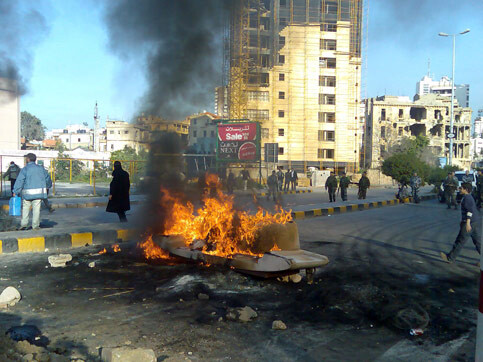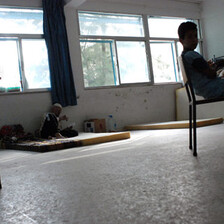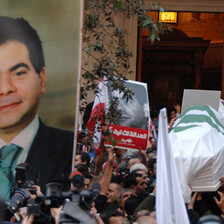Electronic Lebanon 25 January 2007

A couch burns near Sodeco Square during te January 23 strike (Sami Hermez)
PARIS, Jan 25 (IPS) - Representatives of 50 industrial countries and international institutions have pledged 7.6 billion dollars to a recovery plan for Lebanon at a donor conference in Paris Thursday. The fresh aid certainly buys time for the embattled government of Lebanese Prime Minister Fouad Siniora, but it remains doubtful if it can buy it peace.
“This is not a one-shot event to support one particular government,” Siniora told the press, emphasising that the aid should benefit all Lebanese, regardless of their political or religious affiliations. French President Jacques Chirac, who hosted the conference, said that “all political forces and all actors in the region should be involved in the recovery plan.”
Chirac expressed his explicit gratitude to Saudi Arabia, the most important single donor with a pledge of 1 billion dollars, and to the United States, which offered 770 million dollars in new aid, 220 million dollars of which is earmarked to buy weapons and equipment for the Lebanese army. France and the European Commission, the executive arm of the EU, pledged 500 million euro (650 million dollars) each.
Asked if the U.S. would maintain its support if the radical Shia Hezbollah Party would come to power in Lebanon, U.S. National Security Adviser Condoleezza Rice said the United States is currently only dealing with a duly elected government and that Hezbollah has been classified as a “terrorist organisation”.
The total amount of 7.6 billion dollars consists of budget aid, soft loans and project money which will be made available over the next five years. The extra money should enable the Siniora government to pay the wages of civil servants and soldiers, and to service some of its debts.
The Lebanese economy declined 5 percent in 2006, and foreign debt is a record high of 41 billion dollars, the equivalent of 181 percent of the gross domestic product (GDP). The economic situation is largely due to the July 2006 war between Hezbollah and Israel, which has caused a direct loss of 2.8 billion dollars, made 120,000 people jobless and pushed 200,000 skilled young Lebanese into emigration.
The aid programme is dependent on a structural reform programme developed by the Siniora government. By 2011, the debt should be reduced to “only” 144 percent of GDP.
The reform package includes cuts in public expenses, the privatisation of the state telecoms operator, restructuring of the loss-making Compagnie Electricite du Liban, and reforms in pensions and social security.
The programme depends on the fairly optimistic assumption that economic growth will go back to four to five percent as of 2007. This implies that that the present government can somehow overcome the political stalemate which opposes it to the pro-Syrian opposition movement.
The opposition is an alliance between the Hezbollah party, its moderate Shia rival the Amal party and followers of the Christian general Michel Aoun. They demand the resignation of the Siniora government, which they denounce as corrupt and too lenient towards Israel. The June 2006 war increased Hezbollah’s status as the backbone of Lebanese “resistance” against the Jewish state.
In the run-up to the conference the opposition has taken the protest to the streets, paralysing major transport routes in Lebanon. Three persons died in clashes between opposition militants and government supporters during the general strike Tuesday. Two more people died when clashes erupted at Beirut University Thursday.
Chirac defended the donor initiative after a meeting with Siniora in Paris Wednesday, saying that “the price of inaction will be much higher than an engagement on the side of Lebanon.”
The recent political crisis started when six Shia ministers left Siniora’s government in November 2006 over a disagreement on the international tribunal that should investigate the murder on former pro-western prime minister Rafik Hariri in February 2005. The assassination is generally assumed to be the work of neighbouring Syria. Syrian troops left Lebanon in 2005 but the country is still believed to supply weapons to Hezbollah militiamen.
Speaker of parliament and leader of the moderate Shia Amal Party, Ramil Berri, has so far refused to convoke parliament to appoint new ministers and move on with the political process.
In a recent report, the International Crisis group defines the political power struggle in Lebanon as a surrogate for regional and international conflicts. “There is Syria against Israel, the U.S. administration against the Syrian regime, pro-western Sunni Arab regimes led by Saudi Arabia against ascendant Iran and Shia militancy; and, hovering above it all, Washington against Tehran.”
Syria and Iran did not attend the Paris Conference.
All rights reserved, IPS � Inter Press Service (2007). Total or partial publication, retransmission or sale forbidden.
Related Links


